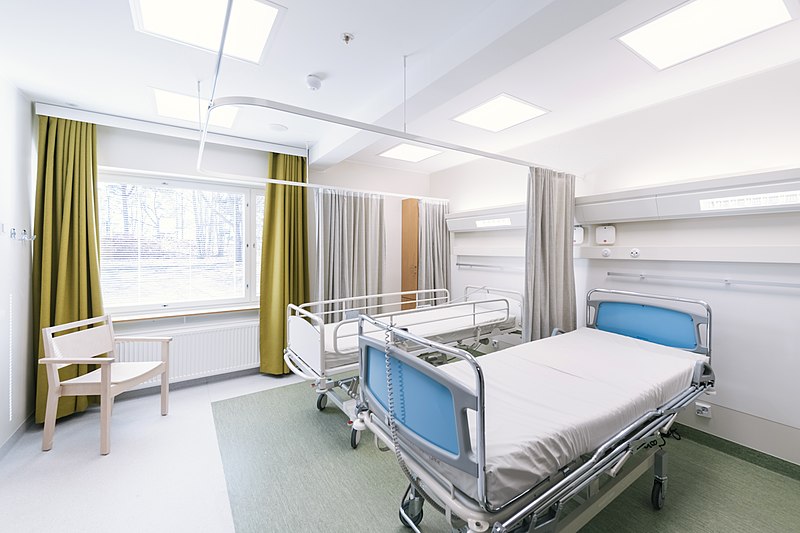There is a shortage of medical respite beds in shelters across the District — beds reserved for homeless people determined to be in need of “limited-time acute and post-acute 24-hour residential care.” The National Health Care for the Homeless Council (NHCHC) says on its website such beds are for “persons experiencing homelessness who are too ill or frail to recover from a physical illness or injury on the streets but are not ill enough to be in a hospital.”
Medical respite operates as if a person is home with nursing care a couple days a week, as described by Dr. Catherine Crosland of Unity Health Care at a Dec. 5 meeting of the Emergency Response and Shelter Outreach Committee of the DC Interagency Council on Homelessness. This differs from both inpatient care and 24/7 home nursing care.
Not every jurisdiction in the D.C. Metro region has beds for people who are discharged from the hospital and don’t have their own place to rest and recover, according to the most recent count of people experiencing homelessness. Venues that do provide such care struggle with insufficient resources to meet the need. The ERSO Committee has been working on ways to increase the number of medical respite beds for more than a year — a goal outlined in the city’s strategic plan to end homelessness.
After medical treatment, individuals may be left stranded, without access to a healthy environment for the amount of time needed to recover. There are presently only 46 medical respite beds in the District, 34 for men at Christ House and 12 for women at the Patricia Handy Place for Women, according to a fact sheet published in October by AmeriHealth Caritas. This number includes three more beds than were operated at Christ House in 2015. All the respite beds are operated by the nonprofit Unity Health Care. Each bed costs approximately $85 per day or $30,754 annually to manage, according to ICH data.
NHCHC records note an additional eight respite beds provided by Joseph’s House, a nonprofit focused on nursing and support services specifically for homeless men and women with advanced HIV disease or terminal cancer.
Now, AmeriHealth Caritas D.C., through a strategic partnership with Volunteers of America – Chesapeake, is investing to provide six new respite care facilities in under two years, according to the fact sheet. Unity Health Care and Pathways to Housing D.C. will also be part of the program, dubbed Hope Has A Home.
Until recently, Christ House has been the flag-bearer for providing respite care to the District’s homeless community. The nonprofit, founded by some of the same people that founded Unity Health Care, has provided medical and recovery services and holistic care in Ward 1 since the 1980s. It is a strong example of how the respite bed issue can be addressed successfully. Christ House demonstrates the positive impact that providing medical respite beds has on individuals in need.
Nearly 80 medical respite programs — referred to as recuperative care in some regions — are available in 29 states and the District, according to the NHCHC, which developed the first ever standards for such programs in 2016. As temperatures drop during hypothermia season, which started on Nov. 1, the need for more respite care capacity remains urgent.
AmeriHealth Caritas DC partnered with the investment firm Quantified Ventures to assess the District’s medical respite needs. The program fact sheet listed three broad takeaways:
- There is a significant shortage in respite capacity overall, and particularly for certain populations (e.g., women) and settings (e.g., non-shelter) and in ways that support trauma-informed care;
- Given the high prevalence of substance use and other behavioral health issues among individuals experiencing homelessness in D.C., there is a significant need for low-barrier respite facilities offering a harm-reduction approach to care;
- The lack of adequate supportive / affordable housing in D.C. will persist as a challenge to optimizing program impact on underlying chronic illness (including mental health and substance use disorder issues). As a result, a longer allowable length of stay in respite care is likely to have a more profound and durable impact.
According to the AmeriHealth fact sheet, “This lack of a safe and supported environment for healing post hospital discharge represents a serious, persistent, and expensive challenge that many in the District want and need to address.”
One month before AmeriHealth Caritas D.C. announced their plan to invest heavily in medical respite for homeless Washingtonians, the District government released regulations regarding implementation for amendments to the Homeless Services Reform Act that were passed in 2017. The law, first passed in 2005, governs the responsibilities of organizations and agencies that provide homeless services, as well as the rights of the people who receive them.
Many pieces of the 2017 amendment involved “modernizing” the law, including defining services like medical respite that had not been widely adopted in 2005. However, some elements of the amendment have caused concern to community members and their advocates, who worry the law will make homeless services more difficult to access. In meetings to develop the amendment there were many conversations about moving people through respite care efficiently. As Street Sense Media reported in 2017, the amendment outlines a clear and efficient process to terminate an individual’s medical respite services and make that person exempt from a standard appeal process, provided a medical professional certifies that the person is no longer in need of that level of care.




